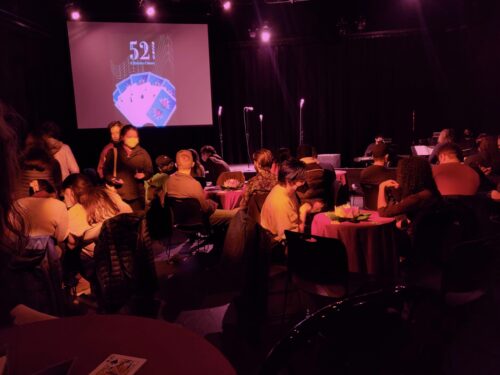The closing number of 52! A Statistics Cabaret concludes an hour of music charting the life story of statistics-lover Lotus. The musical follows Lotus from conception to the age of 52, including a job in quantitative trading, a PhD, and one insane night in Vegas along the way. A different actor portrays Lotus at every stage of their life, and all five gather to end the show with Maroon 5’s song “Memories”:
Here’s to the ones that we got
Cheers to the wish you were here, but you’re not
’Cause the drinks bring back all the memories
Of everything we’ve been through
This moment exemplifies everything that one might take away from the show. First, there is the soundtrack: a series of 21st Century pop songs, each more of a banger than the last, and each expertly sung to the accompaniment of keyboard, bass, and drums. Taylor Swift is there; Olivia Rodrigo is there; Avril Lavigne is there.
Each song is performed with accuracy to the original that makes them instantly recognizable, but the performers sing with a flair and passion that reveals they truly enjoy their work. The result feels, more than anything, genuine. “Expectations” by Lauren Jauregui lives up to its potential as a heart-wrenching lament, while “Waking Up in Vegas” leaves behind the cutesy tendencies of its original singer Katy Perry to become an authentic yet lighthearted argument. The show is a pleasure to listen to, leaving one wishing that copyright laws were relaxed enough that one could purchase a cast album.
The visual experience is understated but effective. 52! takes place in the Loeb Ex, a black-box theater in the Loeb Drama Center, re-imagined as a cabaret venue. The audience is randomly put into small groups and seated at one of several small tables, each with a classic red tablecloth and an intricate origami lotus centerpiece. There is next to no dancing, and most of the performers sing directly to the audience.
What’s most interesting is the decision to convey Lotus’s aging by having different singers take over from each other in the middle of the relevant songs. Furthermore, none of these actors look anything like each other. In a more technically intricate medium, this might have been a problem, but here it serves only to give each audience member a greater opportunity to identify with Lotus.
If that was 52!’s only goal, then the “Memories” scene, the only time all five Lotuses are on stage at once, would be the perfect finale. Unfortunately, though, that same scene also exemplifies the worst of the show. The focus on Lotus means that their friends Alice, Bob, and Carl, their parents Martin and Gale, and even geometric rapper Triggy Triggs do not have a place in the final number. “The ones that we got” turn out to be Lotus and Lotus alone.
In fact, this is not the first time we are left wondering what everyone besides Lotus is doing. Much of the story of 52! centers around Lotus facing and overcoming various forms of discrimination, from the “Alge-bros” in high school to their colleagues in finance who refuse to respect their pronouns. However, we never see any of these people in action, only hearing about them in the vaguest terms from two emcees responsible for narrating the story that connects each number to the next. I don’t doubt that any audience member can imagine what Lotus must have been feeling. However, since we are only told, not shown, what they experience, their eventual discovery of inner strength seems trite and unearned while the condemnation of the bad guys falls flat.
52! is clearly attempting to tackle big questions head-on. The emcees lay into the finance bros with an energy unequaled in any other part of the show. Co-director and co-writer Cas Li writes program notes that ask “Is capitalism truly the solution for sexism? Yet, is there really any other way to elevate oneself in a capitalistic society?” Lotus supposedly suffered in an underperforming K-12 education system, which the emcees blame on “(cough) Common Core (cough).”
Yet, none of these issues are discussed for more than a few seconds. The show offers no solutions beyond #girlbossing (a narrative which Li felt, according to the program, “obligated to reproduce”) and the complex and devastating effects of exclusionary culture are reduced to Lotus singing a sad song instead of a happy one. Digging into the toxic relationships at the core of Lotus’s sufferings would require making space for characters other than Lotus, something the show is unwilling to do.
In the end, we are left with exactly what we were promised: a statistics cabaret. 52! is a fantastic evening of listening to good music performed by great musicians. If that were all it was trying to be, it would have been enough. Instead, 52! tries, admirably, to tell a more meaningful story of overcoming hatred and loving oneself. That this story ultimately failed to land should not detract from the impressive performance of the cast and crew.
Michael Kielstra ’22 (pmkielstra@college.harvard.edu) is more of a pure math person anyway.

